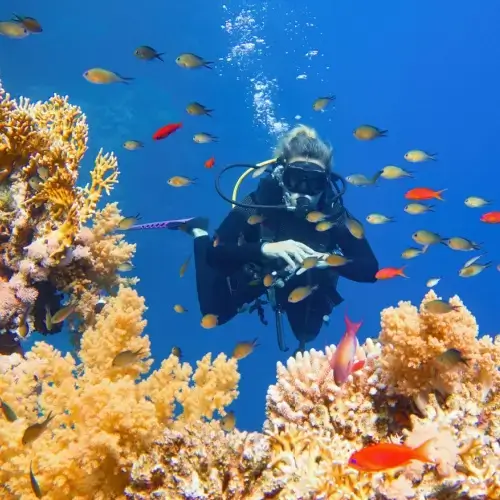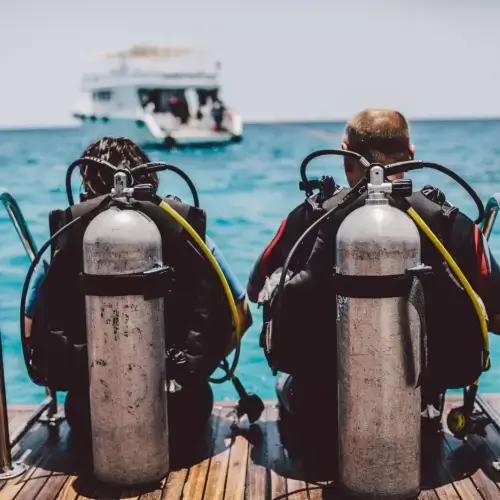Home / Compare Travel Insurance / Travel insurance for Scu…

Key takeaways
- If you are planning a scuba diving activity on your holiday, travel insurance that covers scuba diving can cover emergency medical treatment, medical evacuation, and the cost to repair or replace stolen or damaged scuba equipment.
- Policies that include cover for scuba diving will have limits, conditions and exclusions relating to dive depths, licences and certifications. Many policies will also require you to dive with a licenced instructor.
- If you have a medical condition, ensure you declare it as failing to do so could invalidate your insurance.
Why do I need travel insurance for scuba diving?
 Scuba diving has inherent risks that may cause mishaps, injuries, or medical issues, like decompression sickness, equipment failure, or other underwater accidents. Taking out a comprehensive travel insurance policy that includes cover for losses relating to scuba diving can help protect you.
Scuba diving has inherent risks that may cause mishaps, injuries, or medical issues, like decompression sickness, equipment failure, or other underwater accidents. Taking out a comprehensive travel insurance policy that includes cover for losses relating to scuba diving can help protect you.
The cost of medical treatment in remote locations that Australians may travel to for scuba diving can be expensive. Expenses can rise rapidly if you need specialised care or require a medical evacuation due to an incident. In addition to protecting you against unplanned medical expenses, scuba diving-related travel insurance can also provide cover for trip delays, cancellation costs, personal liability, and other unanticipated problems.
Does normal travel insurance cover scuba diving?
Not all standard travel insurance plans automatically include cover for scuba diving. In many cases, scuba diving is considered a higher-risk activity and may fall under the category of adventure travel insurance. As standard travel insurance typically only covers lower-risk activities, some insurers will only cover diving as an optional ‘adventure’ or ‘sports’ add-on, and others won’t cover it at all.
Before assuming you’re covered, thoroughly review the policy wording to check if you need to purchase additional cover for your trip or opt for a specialised plan that includes scuba diving.
Choosing travel insurance for scuba divers
Before you head off on your diving holiday, it’s important to ensure you’re protected with the correct travel insurance cover. To help you travel confidently, you should always:
- Understand that adventure activities come with risks and choose a travel insurance policy that provides cover to protect you financially against these.
- Check your policy’s level of cover and whether you are covered under the standard policy or need to purchase additional cover for scuba diving.
- Read the Product Disclosure Statement (PDS) before taking out a policy to understand your policy’s inclusions, exclusions and sub-limits. The Target Market Determination (TMD) can also help you decide whether the product is suitable for you.
All about scuba diving cover
Do I need travel insurance with scuba diving cover?
 A policy that includes scuba diving cover has been tailored to suit this activity. Depending on where you’re travelling and the depth you plan on diving to, your cover may offer specific types of cover.
A policy that includes scuba diving cover has been tailored to suit this activity. Depending on where you’re travelling and the depth you plan on diving to, your cover may offer specific types of cover.
When selecting a travel insurance policy for scuba diving, consider the following factors:
- Diving depth limits: Ensure the policy covers the maximum depth you plan to dive, as many policies have depth limits.
- Qualifications: Some policies only cover you if you are a certified diver (e.g. PADI or DAN). Others might cover beginners, but often within depth and supervision limits.
- Activities covered: Confirm that all activities related to scuba diving, such as open water diving or night diving, are included in your coverage.
- Emergency evacuation: Diving accidents may require hyperbaric chamber treatment or emergency evacuation by plane or helicopter, so check if your policy covers these services.
- Exclusions: Pay attention to what is excluded from your policy, such as diving without a buddy or engaging in riskier diving activities like cave or ice diving.
What is the maximum depth covered by scuba diving travel insurance policies?
The maximum depth limits covered by travel insurance for scuba diving vary by policy but commonly range from 18 to 40 metres. There are three main types of policies that cover scuba diving:
- Basic adventure policies: Typically cover dives up to 18 metres and are suitable for beginner divers or those under supervision.
- Advanced policies: These may cover dives up to 30 metres or more and are often purchased by more advanced certified divers.
- Specialised dive insurance: Certain policies may extend coverage to depths beyond 40 metres for technical divers, but these are less common and usually come at a higher cost.
Always verify the maximum depth limit before purchasing a policy to ensure it aligns with your dive plans and certification level.
Can I take out scuba diving travel insurance if I have a medical condition?
Yes, getting travel insurance for scuba diving is possible even if you have pre-existing medical conditions, but it requires careful planning. Many insurers may ask for a medical assessment and may offer cover with certain restrictions or at an additional premium. Declaring any existing health conditions is crucial, as failing to do so could result in a claim being denied or the settlement reduced.
Some medical conditions, such as respiratory or cardiovascular conditions, might affect your ability to dive safely. Always seek a policy that provides cover for pre-existing medical conditions and make sure you declare all conditions to ensure you know what is and is not covered. You may need to pay an additional premium in some circumstances.
Scuba diving insurance inclusions and exclusions
What does scuba diving insurance include?
To dive with peace of mind, it’s crucial to understand what your travel insurance covers when you add-on scuba diving insurance as an optional extra or ‘pack.’ Below are some scenarios that may be included with travel insurance that covers scuba diving:
- Medical and emergency rescue: Scuba diving can take you to some beautiful but remote locations, which can be risky if an emergency occurs. If you suffer from decompression sickness or another diving-related injury, emergency medical repatriation and subsequent medical assistance can cost thousands of dollars. A travel insurance policy that includes scuba diving could cover these medical expenses and provide peace of mind.
- Sporting equipment damage, theft, or loss: Whether you’re using your own scuba gear or renting it, there’s always a chance it could be damaged accidentally, lost in transit or stolen. Travel insurance with scuba diving coverage may pay for repairs or replacement of rented gear and your own equipment. However, remember that most policies won’t cover damage to diving equipment while it’s in use or if it’s left unattended or lost in transit.
- Unused equipment and dive packages: If you’re unable to use pre-paid dive equipment, guided dives, or diving courses due to illness, injury or lost documentation (like a diving certification card), your policy may reimburse you for these costs. Check whether your policy covers situations like stolen dive passes or cancelled dives due to unforeseen issues.
- Trip cancellations due to weather: If poor weather or dangerous conditions force dive operators to cancel your dives, your insurance may cover costs for additional expenses, such as travel to an alternate dive site or the cost of rescheduling a dive trip.
It’s worth noting that travel insurance policies typically place caps on the amount they cover in each scenario, so always read the PDS so you know what’s included and any limitations that may apply.
What does scuba diving insurance exclude?
Before purchasing a policy for your scuba diving trip, it’s important to understand what this insurance won’t cover. Exclusions can vary by insurer, but common exclusions include:
- Diving without certification or beyond your training level: While you might be excited to push your limits, most insurance policies won’t cover you if you dive deeper than you’re certified for or participate in specialised diving activities without proper certification. Always stay within the boundaries of your certification level to stay covered.
- Diving outside safe conditions: Policies generally exclude coverage for risky diving activities, such as wreck diving, cave diving, or diving in areas with poor visibility or dangerous conditions (unless these activities are explicitly included in your policy). It’s important to confirm what specific types of dives your insurance covers.
- Accidents while under the influence: Having a drink to celebrate a successful dive is fun, but never mix alcohol or drugs with scuba diving. If you’re involved in an accident and it’s found you were under the influence, your insurance won’t cover your medical or evacuation expenses.
- Diving with pre-existing medical conditions: If you have a medical condition such as asthma or heart problems that may pose a risk while diving, some policies may not cover you for diving-related incidents unless you’ve declared the condition and paid any required additional premium. Even if the policy doesn’t cover your pre-existing condition for diving, it’s wise to have insurance that covers general emergency assistance and medical evacuation.
- Diving beyond policy depth limits: As mentioned earlier, most policies have a maximum depth limit for coverage, typically ranging from 18 to 40 metres. Diving beyond the depth covered by your insurance may void your coverage in the event of an incident.
Meet our travel insurance expert, Adrian Taylor
As a General Insurance expert with over 13 years’ experience in financial services, Adrian Taylor believes in educating customers about the importance of travel insurance so that anyone can kick back and make the most of their time away from home. While no one wants a disrupted holiday, a suitable travel insurance policy can provide a financial safety net for yourself, your belongings and your trip in case things go wrong.



